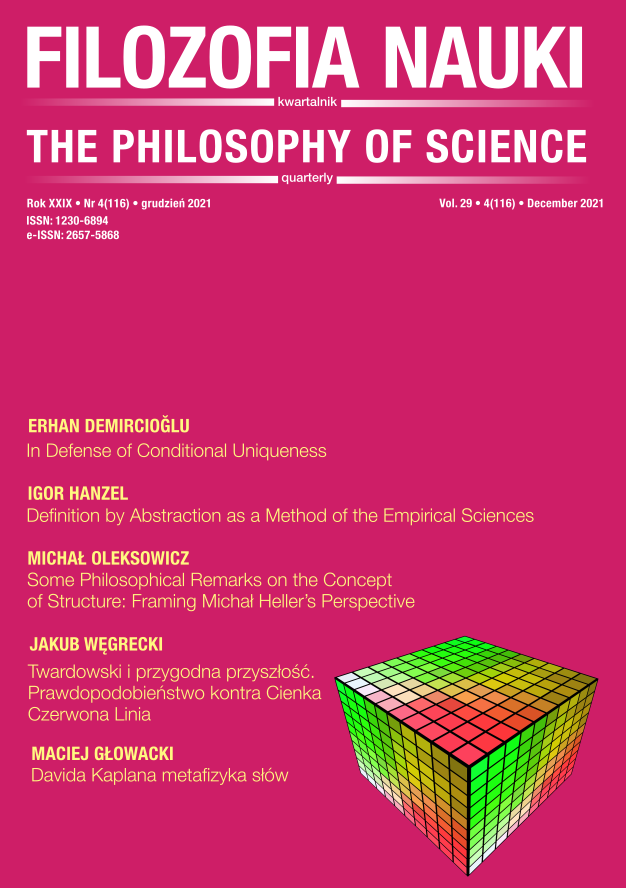Twardowski i przygodna przyszłość. Prawdopodobieństwo kontra Cienka Czerwona Linia
DOI:
https://doi.org/10.14394/filnau.2021.0023Słowa kluczowe:
Kazimierz Twardowski, Thin Red Line, future contingents, probability, propositions, Branching-TimeAbstrakt
One of the most widely discussed philosophical issues is the problem of future contingents. Basically, the challenge is to create an adequate semantic theory of future-tensed sentences. Twardowski (1900) suggests that future contingent statements should be analyzed using the concept of probability.
The aim of this paper is to show that (1) such an analysis is not appropriate and (2) that Twardowski’s main theses imply the Thin Red Line Theory. I discuss three potential arguments against my proposal and sketch the connection with Schaffer’s Parallelism Thesis (2012).
Bibliografia
Barnes E., Cameron R. (2009), The Open Future: Bivalence, Determinism and Ontology, „Philosophical Studies: An International Journal for Philosophy in the Analytic Tradition” 146(2), 291-309. https://doi.org/10.1007/s11098-008-9257-6
Belnap N. (2002), Double Time References: Speech-Act Reports as Modalities in an Indeterminist Setting [w:] Advances in Modal Logic (vol. 3), F. Wolter, H. Wansing, M. de Rijke, M. Zakharyaschev (eds.), Singapore: World Scientific, 37-58. https://doi.org/10.1142/9789812776471_0003
Belnap N., Perloff M., Xu M. (2001), Facing the Future: Agents and Choices in Our Indeterministic World, Oxford: Oxford University Press.
Ciuni P., Proietti C. (2013), The Abundance of the Future: A Paraconsistent Approach to Future Contingents, „Logic and Logical Philosophy” 22, 21-43. https://doi.org/10.12775/LLP.2013.002
Egan A. (2007), Epistemic Modals, Relativism, and Assertion, „Philosophical Studies” 133(1), 1-22. https://doi.org/10.1007/s11098-006-9003-x
Fritz P., Hawthorne J., Yli-Vakkuri J. (2019), Operator Arguments Revisited, „Philosophical Studies” 176, 2933-2959. https://doi.org/10.1007/s11098-018-1158-8
Kaplan D. (1989), Demonstratives [w:] Themes from Kaplan, J. Almog, J. Perry, H. Wettstein (eds.), New York: Oxford University Press, 481-563.
Kissine M. (2008), Why Will Is Not a Modal, „Natural Language Semantics” 16(2), 129-155. https://doi.org/10.1007/s11050-008-9028-0
Kokoszyńska-Lutmanowa M. (2002), Co znaczy „relatywność prawdy”?, „Filozofia Nauki” 10(3-4) [39-40], 149-158. https://www.fn.uw.edu.pl/index.php/fn/article/view/350
Lewis D. K. (1980), Index, Context, and Content [w:] Philosophy and Grammar, S. Kanger, S. Öhman (eds.), Dordrecht: D. Reidel, 79-100. https://doi.org/10.1007/978-94-009-9012-8_6
MacFarlane J. (2003), Future Contingents and Relative Truth, „The Philosophical Quarterly” 53(212), 321-336. https://doi.org/10.1111/1467-9213.00315
MacFarlane J. (2008), Truth in the Garden of Forking Paths [w:] Relative Truth, M. García-Carpintero, M. Kölbel (eds.), Oxford: Oxford University Press, 81-102. https://doi.org/10.1093/acprof:oso/9780199234950.003.0004
MacFarlane J. (2014), Assessment Sensitivity: Relative Truth and Its Applications, Oxford: Oxford University Press. https://oxford.universitypressscholarship.com/view/10.1093/acprof:oso/9780199682751.001.0001/acprof-9780199682751
Matuszkiewicz K. (2015), Kazimierza Twardowskiego dyskusja z relatywizmem, „Studia Philosophica Wratislaviensia” 10(3), 59-80. https://wuwr.pl/spwr/article/view/5054
Moss S. (2016), Probabilistic Knowledge, Oxford: Oxford University Press. 10.1093/oso/9780198792154.001.0001
Øhrstrøm P. (2009), In Defence of the Thin Red Line: A Case for Ockhamism, „Humana.Mente” 8, 17-32.
Øhrstrøm P. (2019), A Critical Discussion of Prior’s Philosophical and Tense-Logical Analysis of the Ideas of Indeterminism and Human Freedom, „Synthese” 196, 69-85. https://doi.org/10.1007/s11229-016-1149-2
Øhrstrøm P., Hasle P. (1995), Temporal Logic: From Ancient Ideas to Artificial Intelligence, Dordrecht: Kluwer. https://link.springer.com/book/10.1007/978-0-585-37463-5
Øhrstrøm P., Hasle P. (2020), Future Contingents [w:] Stanford Encyclopedia of Philosophy (Summer 2020 Edition), Edward N. Zalta (ed.), https://plato.stanford.edu/entries/future-contingents/
Prior A. N. (1967), Past, Present and Future, Oxford: Clarendon Press. https://doi.org/10.1093/acprof:oso/9780198243113.001.0001
Rabern B. (2012), Against the Identification of Assertoric Content with Compositional Value, „Synthese” 189, 75-96. https://doi.org/10.1007/s11229-012-0096-9
Schaffer J. (2012), Necessitarian Propositions, „Synthese” 189(1), 119-162. https://doi.org/10.1007/s11229-012-0097-8
Stalnaker R. (1976), Possible Worlds, „Noûs” 10(1), 65-75. https://doi.org/10.2307/ 2214477
Thomason R. (1970), Indeterminist Time and Truth-Value Gaps, „Theoria” 36, 264-281. https://doi.org/10.1111/j.1755-2567.1970.tb00427.x
Thomason R. (1984), Combinations of Tense and Modality [w:] Handbook of Philosophical Logic, vol. 2, Dordrecht: D. Reidel. https://doi.org/10.1007/978-94-009-6259-0_3
Twardowski, K. (1900), O tzw. prawdach względnych [w:] Księga Pamiątkowa Uniwersytetu Lwowskiego ku uczczeniu pięćsetnej rocznicy Fundacji Jagiellońskiej, Lwów: Uniwersytet Lwowski, 64-93.
Wawer J., Malpass A. (2020), Back to the Actual Future, „Synthese” 197, 2193-2213. https://doi.org/10.1007/s11229-018-1802-z



















 Filozofia Nauki | ISSN 1230-6894 | e-ISSN 2657-5868
Filozofia Nauki | ISSN 1230-6894 | e-ISSN 2657-5868